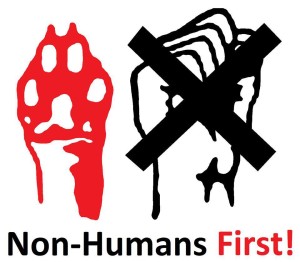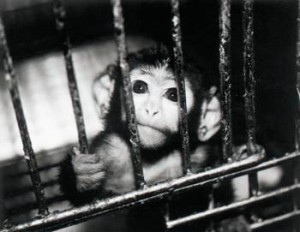There is an animal rights activist group trying to shake things up by taking three steps backwards and dragging veganism/ animal rights to an all-time low. They recently put forward a declaration titled “Non-Human Animals First.” Their mission? Vegans need to put animals first because apparently we are back in the activist dark ages, during which we assumed activism was a zero-sum game. Also, something about temporality because certain groups have to be “first” or “not first” or something like that for a movement to achieve anything.

A representative of the group (which I will refer to as NHFirst) wants us to use the single-issue mindset espoused by early women’s liberation efforts, civil rights, etc as evidence that an intersectional approach is not needed. For instance, NHFirst points out that MLK Jr. was a “sexist” and “homophobe” and that while “it is great to be against all injustice, in reality people are complex and have differing views.” Who knew that being a sexist or a homophobe was simply a sign of character complexity?!
It speaks volumes that NHFirst is willing to deal with and accept “complex” characters like racists, sexists and homophobes, but not willing to deal with and accept speciesists. This position echoes the ridiculous synchronic position I keep seeing in the animal rights movement which goes like this: If we just accept everyone, no matter how horrendous they are, we’ll have more people “for the animals.” They don’t seem to realize that over time, we will lose people from the movement since women, people of color, homosexuals, disabled people, etc will run the hell away. If we are all in a movement, we have to work together and that’s not going to happen if the movement is filled with people who have attitudes that motivate particular behaviors toward particular people against whom they hold those attitudes.
Moreover, they seem to overlook the fact that the lack of intersectionality that plagued (and continues to plague) many early (and current) movements is the precise reason we are still dealing with the very same problems those movements sought (and seek) to dissolve. Corey Lee Wrenn has already pointed out that NHFirst’s approach fails to appreciate what I call the ‘pernicious holism’ existing among speciesism, sexism, racism, ecocide, etc., and, as such, cannot possibly begin to dismantle our dependence and subsequent exploitation of animals. In other words, if we correctly identify the depth of the problem- that is, that the exploitation of animals is systemic and a crucial element of the ‘pernicious holism’- but we refuse to engage with the problem -the system of pernicious holism itself- then, we are doing absolutely nothing to address the problem of animal exploitation. All of NHFirst’s words are basically a lot of hot air.
As a charitable reader, I initially assumed NHFirst had good intentions that simply went horribly awry. After all, at one point many of my vegan companions were very animal-focused in their activism and never thought to incorporate human rights activism into their “animal work.” NHFirst, on the other hand, explicitly go out of their way to mention their awareness of (daily) human rights violations and human suffering only to point out that those violations should remain outside the range of our concern as vegans. Animal exploitation is an emergency situation whereas human exploitation is. .. well, just something brown people and women need to suck up because ANIMALS FIRST.
I don’t think the “brown” and “woman” stuff is wholly coincidental to NHFirst’s insistence to downplay the extent of human suffering. In fact, I think it is precisely because exploited humans are generally non-white and/or women that NHFirst thinks it’s totally fine to pretend human suffering has nothing to do with or cannot be addressed in conjunction with animal suffering. We all know that if there were to be a holocaust disproportionately impacting white or white-looking people, everyone would think it highly inappropriate to start yelling, “ANIMALS FIRST!”
Having said all of that, I don’t mean to claim that vegan/animal rights activism is reducible to civil rights activism or feminist activism or other human rights activism and I don’t mean to suggest that any species of human rights activism is reducible to vegan/animal rights activism. Certainly feminism has a specific beneficiary in mind; namely, feminism seeks to grow the rights and improve the lives of women, while gay rights activism seeks to grow the rights and improve the lives in the LGBTQ community, and so on and on with other oppressed groups. In the same vein, veganism/animal rights activism seeks to grow the rights and improve the lives of non-human animals. I don’t mean to deny the constraints that determine the specific flavor of distinct activisms. However, what I do claim is that achieving those specific ends of distinct activisms requires taking into account other social forces that shape and affect the specific -ism we seek to dismantle in any activist site.
For (an easy) example, a feminist activist who fails to acknowledge the unique role race and class plays in shaping the very gendered oppression that women face, especially women of color or poor women, cannot begin to adequately engage with, address, or dismantle gender oppression. She would be missing crucial components that shape sexism. So, one activism cannot be carried out in isolation from other activisms. It has to be done in concert with other movements (which is why the great Frederick Douglass said, “All great reforms go together.”)
I would like to take this one step further in the case of animal exploitation. Unlike any other oppressed group (possibly with the exception of prison inmates), animals are the only group that has never been granted rights. That is, although (some) animals have been granted some measure of legal protections, none have been granted proper rights in the United States. Rights language is needed to formally acknowledge the vulnerability and violability of beings. Unlike animals, humans have all been granted rights simply by virtue of being human. The distinction that rests between oppressed humans and animals, then, is this: while oppressed humans’ rights remains in the space of theory- that is, those rights are rarely enforced in practice despite having been granted- animals simply don’t have rights. There is nothing to enforce since nothing has been granted. This leads to a terrifying revelation: beings can be rights-having subjects and still face horrifying violence and exploitation, as we see with oppressed humans.
Hence, taking oppressed humans into consideration, the problem we face as vegan activists is actually two-fold: first, animals are not granted rights. In other words, even in the space of theory, animals are not seen as subjects that can be rights-having, which means they are not seen as beings that can be properly violated or vulnerable. Killing them, eating them, torturing them, raping them, etc are not considered ‘violations’ in the robust sense of the word. Second, even if animals were to be granted rights, there would be no assurance that these rights would be enforced in practice. Like most humans, animals’ rights would remain in the space of theory, which leaves them practically in the exact same position they were in before: subject to violence and exploitation.
Even if one cannot see the pernicious holism among the -isms that Corey Lee Wrenn and other writers point out, the fact remains that vegans have a duty to involve themselves in human rights activisms to make sense of and work to close the gap between rights in the space of theory and rights in the practical sense. If granting rights is the only means to formally establish violability and vulnerability, but rights-having subjects continue to be violated and exploited in practice, then rights-having is essentially useless. It would be a shame if we worked this hard and this long to gain rights for animals only to have those rights ring hollow in the face of violence and exploitation.
NHFirst, then, is very, very wrong. It does matter if your movement is riddled with sexists, homophobes, racists, and the like because these are the very kinds of attitudes that play a role in nullifying the practicality of rights-having. Sure, plenty of historical figures that played a large part in movements were sexists, homophobes, racists, etc., but that only explains why sexism, homophobia, racism, etc are even more deeply (and invisibly) embedded in the structure of present-day society. It doesn’t explain why that’s a good template to follow in our movements today. We know better.
By Syl

